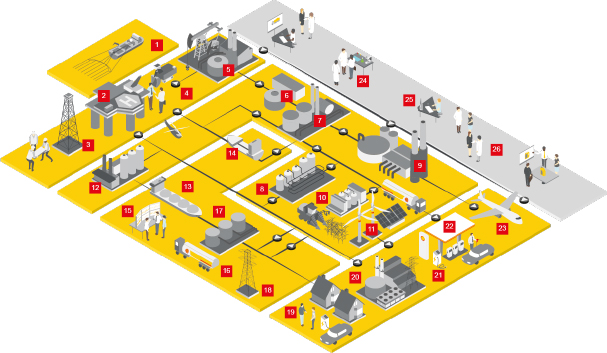United Kingdom
6,627 Employees
-
Third-party revenues
$13,759,505,495
-
Related-party revenues
$42,653,451,207
-
Total revenues
$56,412,956,702
-
Profit before tax
$(961,312,454)
-
Tax paid
$(66,144,531)
-
Tax accrued
$(87,057,379)
-
Tangible assets
$13,715,465,014
-
Stated capital
$129,398,998,112
-
Accumulated earnings
$18,129,651,601
Main Business Activities
- Upstream and Integrated Gas
- Downstream
- Chemicals
- New Energies [A]
- Trading and Supply
- Other support activities
Shell has been present in the UK since 1897. We remain one of the North Sea’s biggest producers, supplying around 10% of the UK’s total oil and gas needs. Our gas plants, pipeline systems and import terminals deliver more than 20% of the UK’s gas supply.
Through Shell Energy, we provide home electricity to around 900,000 customers in the UK. We continue to invest in electric mobility infrastructure to support the UK’s switch to electric vehicles.
Support activities include our Projects & Technology teams based in Aberdeen and London. They support the delivery of major projects around the world, from developing gas-to-liquids plants to deep-water exploration. Every year, Shell spends more than £200 million [B] on research and development in the UK. There is also a treasury team in London that provides cash management and financial services.
[A] New Energies was rebranded to Renewables and Energy Solutions in 2021.
[B] This is the equivalent of $257 million calculated using yearly average exchange rate for USD/GBP in 2020 of 1 USD = 0.7795 GBP.
Country Financial Analysis
The corporate income tax rate in the UK is 40% for upstream UK continental shelf activities and 19% for all other activities.
Shell did not pay corporate income tax in 2020 because of tax losses arising in the current and previous years. These losses are due to significant upstream investment in the UK continental shelf. Shell also received tax refunds related to decommissioning costs incurred. See Case study: Tax treatment of decommissioning costs in different jurisdictions for more information.
Decommissioning is a cost incurred as part of the life cycle of the field and is tax deductible. For late-life assets, decommissioning costs can generate net tax losses that offset profits made and taxes paid in previous years. As a result, tax that has effectively been overpaid is refunded.
Our Payments to Governments Report for 2020 also shows payments of around $7 million in fees.








